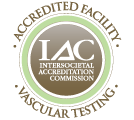Dr. Albert D. Sam has had a chapter featured in a new book titled “Ischemic Stroke: Diagnosis and Treatment.” Below is an excerpt from his chapter titled “Treatment of Symptomatic Carotid Stenosis”:
Epidemiology of Carotid Disease and Stroke
The percentage of ischemic strokes resulting from atherosclerotic debris that embolizes from the extracranial carotid artery into the cerebral circulation is 20% to 30%(1,2). Atherosclerosis results from the adverse impact of modifiable risk factors, resulting in inflammation within the circulatory system that causes endothelial injury whose end result is calcium deposition within the arterial wall. These risk factors for developing carotid atherosclerotic disease include smoking, hypertension, hypercholesterolemia and diabetes.



